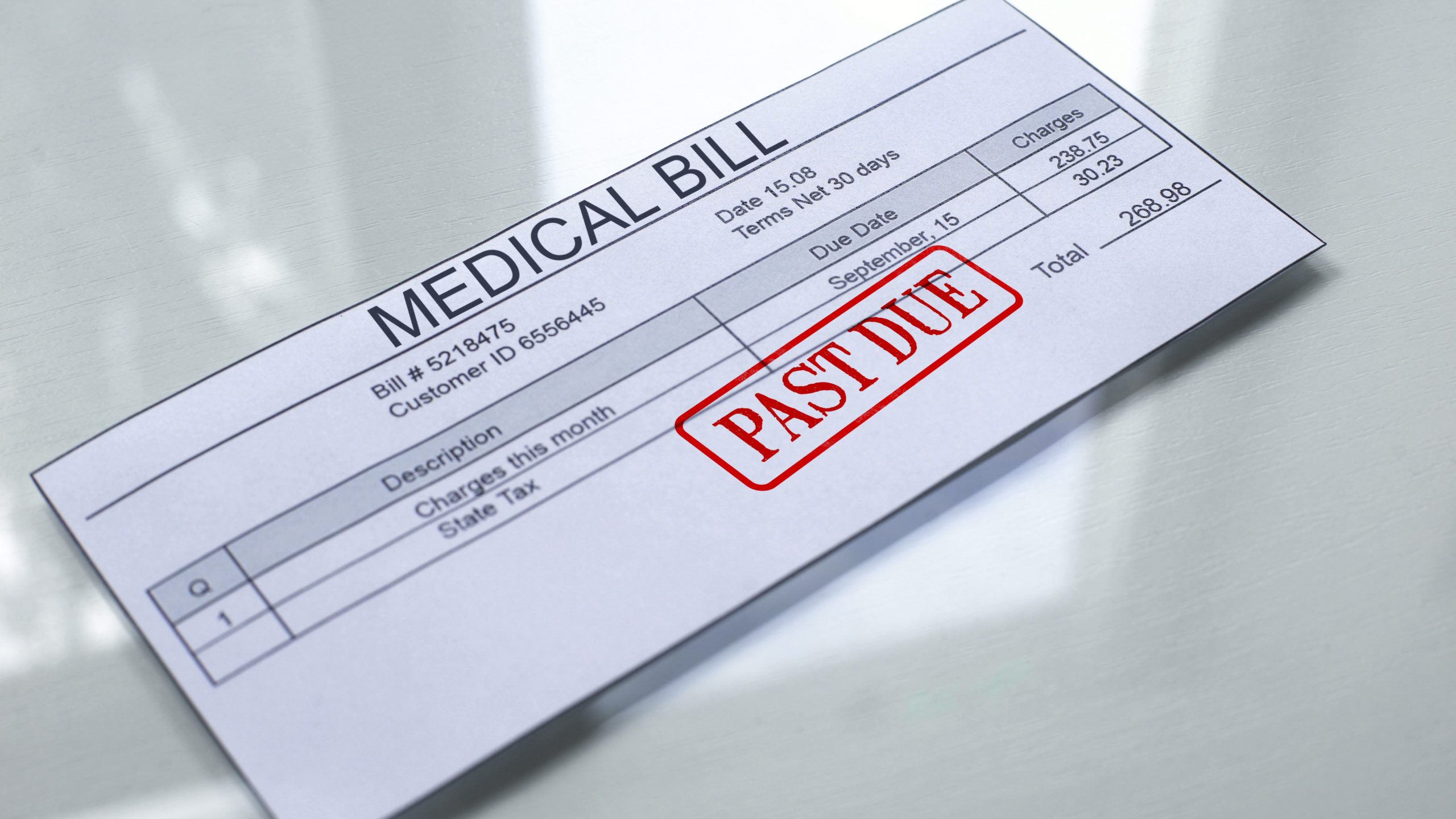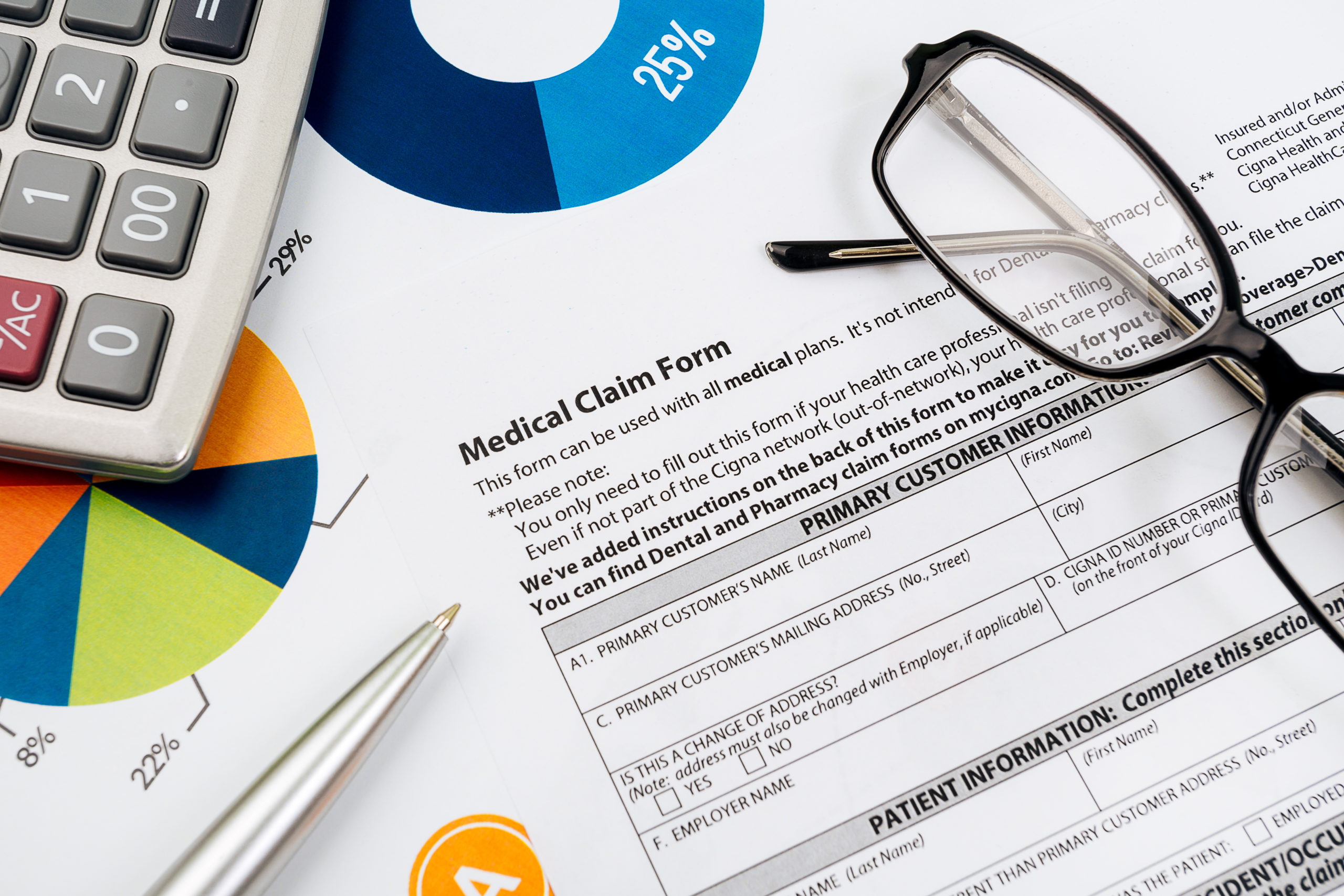Healthcare expenses in America have long been a problem. However, it wasn’t until 2021 that we learned how far-reaching the problem is. At over $180 billion, medical debt became the largest source of debt in collections.
How much medical debt is in collections? There are more unpaid medical bills in collections than all other debt types combined.
In this article we’ll be exploring three ways to lower medical debt in collections.
First, take a moment to enter your email below to receive our free Financial Wellness email series to receive simple and effective strategies to bring financial wellness into your world.

At National Legal Center, we know debt.
Medical bill debt relief can be had several ways. Some options to lower your medical debts may be more advantageous than others, depending on your circumstances.
The debt settlement attorneys at National Legal Center negotiate medical bills for clients in a variety of situations. Here are three ways to lower medical debt in collections before and after your medical provider places the accounts with a third-party collection agency.
For a free review of your medical debt, complete the form below and a member of our legal team will reach out to discuss medical debt relief options.
1. Reduce Your Medical Bills with Charity Care
When you need to lower your medical bills, you should usually start with the medical provider. You’ll usually find the hospital’s billing staff or doctor’s office to be helpful. Sometimes they can even be your strongest billing advocate!
The representatives in the billing department are familiar with medical billing errors, billing codes, charity care programs, and more.
If your account hasn’t been sent to a medical debt collection agency yet, this may be your best way to keep the account current and prevent medical collections from landing on your credit report.
How to reduce medical debt in collections with charity care
“Charity care” is a discount program offered by hospitals, clinics, and health care providers. It is also known as a Financial Assistance Program. It helps individuals with lower income meet the expense of medical treatment they might not afford otherwise.
Non-profit hospitals must offer charity care (a Financial Assistance Program) to maintain their tax-exempt status. There are some requirements, but the specifics of the charity care program are generally left to the individual hospitals. The primary intent of the programs is to reduce medical costs for people who fall within specific income parameters or who meet other qualifying circumstances.
While all non-profit hospitals should have charity care programs, they don’t always make them very well known.
Ask the billing department for information on the medical provider’s charity care program. The Financial Assistance Programs usually reduce medical expenses on a sliding scale, so the less you earn, the more you benefit. Don’t let that deter you from applying if you have a fair income, though. Other factors come into play, too, such as:
- Income
- Number of dependents
- Cost of medical treatment
- Type of medical treatment
- Employment status
- Monthly expenses
- Savings available
Given that the Financial Assistance Programs review many criteria to determine whether or not you qualify for a reduction, you should at least consider applying for charity care to lower medical bills no matter your income.
What happens after using charity care to reduce a medical bill?
After applying for charity care, you’ll receive a letter letting you know the outcome of the review. Depending on your circumstances and the program’s guidelines, the provider might waive the medical bill entirely. Or, it is also possible that they may partially reduce the debt rather than extend total medical bill forgiveness.
Once the balance you owe is updated, you can make monthly payments or a lump sum payment to cover the remaining unpaid medical bill.
Does using charity care to lower medical bills affect credit?
No. Charity care is a form of financial assistance that can help you lower your medical bills. However, it does not impact credit scores or your ability to get treatment from medical providers in the future.
There are two exceptions.
If you still have a balance owed after adjustments from charity care, failing to pay it could result in the collection agency reporting the account on your credit report. So long as you pay the bill, you’re good to go!
The only other exception here is if the account was already handled by a collection agency when the provider applied the charity care. In that case, the collection agency should update your credit reports with the new balance. Then, once you pay the debt in full, it should reflect a $0 balance on your credit report.

2. Lower Medical Bills by Identifying Errors
It’s easy to get confused between technical explanations of benefits from health insurance companies and multiple bills from healthcare providers. All the paperwork falls into our unfamiliar hands, and most of us just assume the information is correct.
We should be able to trust that the service provider and insurer have correctly charged for medical care, right?
Not so fast.
The American Medical Association estimates that around 75% of medical bills contain errors. Clearly, medical coding and billing errors are incredibly common, so it is best to begin taking a closer look at those bills.
Addressing errors with the billing department.
Just as with charity care, you may be able to reduce your medical bills by addressing errors with your medical providers. The same individuals who can help with charity care can also help you review your medical bill for accuracy.
It will help to have specific items that you’d like them to review with you, but if you need them to go line by line to help you understand what they’re asking you to pay, don’t hesitate!
We pay a tremendous amount of money for medical care in America. It’s okay to utilize the hospital or doctor’s office resources to ensure you have a confident understanding of what you’re paying for.
What happens after identifying errors to lower medical costs?
If you identify errors and bring them to the provider’s attention, you can expect medical bill debt relief. They’ll send a revised bill showing the new balance. The new statement will reflect the amount you’ll need to pay to avoid medical collections.

3. Lower Medical Bills by Negotiating a Settlement
Negotiating medical bills in collections is a great way to reduce the total amount owed on a medical account. Once the provider has placed your account with a third-party agency, you may have an easier time negotiating. Negotiation is common for debt collection agencies, whereas medical billing departments are more likely to explore payment plans or other balance in full options.
How do you negotiate medical debt collections?
If you want to negotiate a medical bill in collections, you’ve got two main options: negotiate a lump sum settlement, or make a payment plan. Your financial situation will determine which approach is best for you.
Settling medical debt with a lump sum payment
You will usually get the best deal if you can offer a lump sum settlement to resolve the account.
Debt collectors prefer lump-sum settlements because the account is satisfied, and they can move on and focus on the next debt. These can be significant benefits for you, too! However, this can be difficult depending on the size of the debt.
If you can manage a lump sum settlement of your medical debt, this is the way to go.
Settling medical debt with a payment plan.
Another option to save money on medical debt collections is negotiating a monthly payment plan toward a settlement.
The concept is the same: you pay less than the total balance owed. The only difference between this and the lump sum approach is that you make payments toward the medical debt settlement each month.
When speaking with the medical debt collectors, you will want to share your financial hardship and know in advance what kind of monthly payment arrangements you can afford.
A few suggestions for medical debt settlement.
There are a few suggestions to keep in mind when trying to reduce medical bills through debt settlement.
- Don’t overcommit and leave yourself without enough money for your other bills.
- Avoid using a credit card or personal loan to pay your medical debt; medical debt is generally non-interest-bearing, so you don’t want to replace an interest-free debt with high-interest credit card debt.
- Get any medical debt settlement arrangement in writing.
How much should you offer to settle medical bills?
The amount you offer for a settlement will depend on your financial situation and the size of the debt. The more you can offer, the better chance you will get the debt collector to accept your offer. If you have a legitimate hardship, share it with the collector. Make a case for why they should consider taking less than the full amount.
Common hardships include:
- Loss of income
- Death of a family member
- Unexpected medical expenses
- Unexpected increase in living expenses
Whatever the situation is, try to be clear without oversharing. Remember, collectors can use anything you say to collect on the debt, so sharing too much can work against you. For example, it can help to tell them that your employer cut your hours at work, but you don’t necessarily want to share where you work or your supervisor’s name. This “extra” information could make it easier for them to use scare tactics in the future or to garnish wages if they were to file a medical debt collection lawsuit.
Simply state what you can without making it too easy for them to use this against you in the future.
Another factor is how much you owe. For example, if you have a large medical bill, they might realize that you have little chance of repaying the entire debt. Therefore, you might negotiate a better percentage when dealing with large medical accounts since there is more to gain (and lose!).
A reasonable end goal for a settlement might be 50-75% of the amount owed. If your hardship is significant, start significantly lower. At the end of the day, if you reach an affordable deal and are satisfied with the outcome, you’ve been successful.

Medical bills in collections and your credit report.
There has long been debate about whether or not medical expenses should affect your credit score at all.
After all, it’s not a financial failure to fall ill.
Alas, medical debt does appear on your credit report even though it isn’t a loan and there is no financial institution involved. Medical debts are only reported to the credit bureaus if it falls behind. So, making a payment plan or paying the medical bill in full will keep the account from popping up on your credit reports.
A recent study from debt.com shows that 56% of Americans have medical debt, and 46% have medical debt in collections. When this happens, your score drops, and you may have a more challenging time qualifying for financing. The lower credit score might not stop you from qualifying, but you may have a higher interest rate on your loans as a result.
Medical debt is treated differently than other debts on your credit report.
The major credit bureaus treat medical debt differently than other types of consumer debt.
The primary difference? A grace period.
Unpaid medical bills will not appear on your credit report for 180 days after the debt goes to collections. The 180 day grace period for medical debt allows you time to deal with discrepancies between your healthcare provider and your insurance company. Sometimes, seeing the remark on your credit report may be the first time you learn you owe the debt, making this grace period very helpful.
Should you work with a debt settlement attorney to settle medical debt?
Often, yes!
A good debt settlement lawyer will know the ins and outs of unpaid medical debt, be able to work your deal specifically with your situation in mind, and ensure that you are aware of all the best options available to you. Here at National Legal Center, our team can put together a plan for you that considers all of your debt, such as credit cards, personal loans, and more. Since they can focus beyond just the medical expenses, you’ll have a plan of action to better your overall situation.
Beyond that, a debt settlement attorney can take action against a debt collector violating your rights. Sometimes this can even result in you receiving monetary damages.
Your debt settlement attorney doesn’t just want to get you a great deal. They work hard to protect your rights and maximize your chances of success.
Even if it seems like your options are limited, a skilled debt settlement attorney can review your situation and figure out how best to resolve your debts and show you the best way forward.
Benefits of a debt settlement attorney over a debt settlement company.
For-profit debt settlement companies may also offer to assist with medical bills. However, there are a few significant differences between debt settlement companies and debt settlement attorneys.
The first is that debt settlement companies cannot offer legal advice. Medical debt collection lawsuits are very common! It is best to have an attorney who can provide legal guidance through what can be a frightening legal situation.
Also, debt settlement companies cannot take action against debt collectors who violate your rights.
Lastly, the fees charged by a debt settlement company tend to mirror the amount charged by debt settlement attorneys. So, why pay the same amount without the ability to receive legal advice or have legal representation for your medical debt and credit report errors?
Get the legal representation you deserve. Complete the form on this page to speak with a representative of National Legal Center about your medical debt today.
What happens after settling your medical debts?
After you have fully paid your medical debt settlement, the account should appear on your credit reports as “settled in full” within 30-60 days. While having the account reported as settled in full is considered a negative remark, it is far better than having an unpaid collection account.
Medical collections will remain on your credit reports for up to seven years from the original delinquency date.
In some cases, the collector may choose to remove the remark from your credit reports. Or, if something seems wrong, you can dispute inaccurate information with each of the three credit bureaus to ensure your credit reports only contain accurate and verifiable information.
What is National Legal Center?
The Law Office of Fox, Kohler & Associates, PLLC, does business as National Legal Center. We are a law firm with a philosophy rooted in fostering strong client relationships.
Our approach is simple: we believe we cannot effectively assess the needs of our clients until we get to know them.
Our clients come to us in times of severe financial hardship and stress. Whether you need help with medical debts you thought would be covered by a health insurance company, unmanageable credit card debt, or debt collection harassment, we’re here to help you #standuptodebt.
We respond with sensitivity and compassion and pride ourselves on being straightforward with our clients—every time.
Consumer protection attorneys can help with medical bills in collections.
The professional legal team at National Legal Center can help you resolve medical collections.
We’ll help you obtain a free credit report, review all collection accounts, and create a plan of action to deal with your debt situation. In addition, we can share information on the impact on your credit score, take action against illegal collection practices, and do it all with affordable monthly payments at the forefront of our strategy for you.
Complete the form below to #standuptodebt with National Legal Center today!




